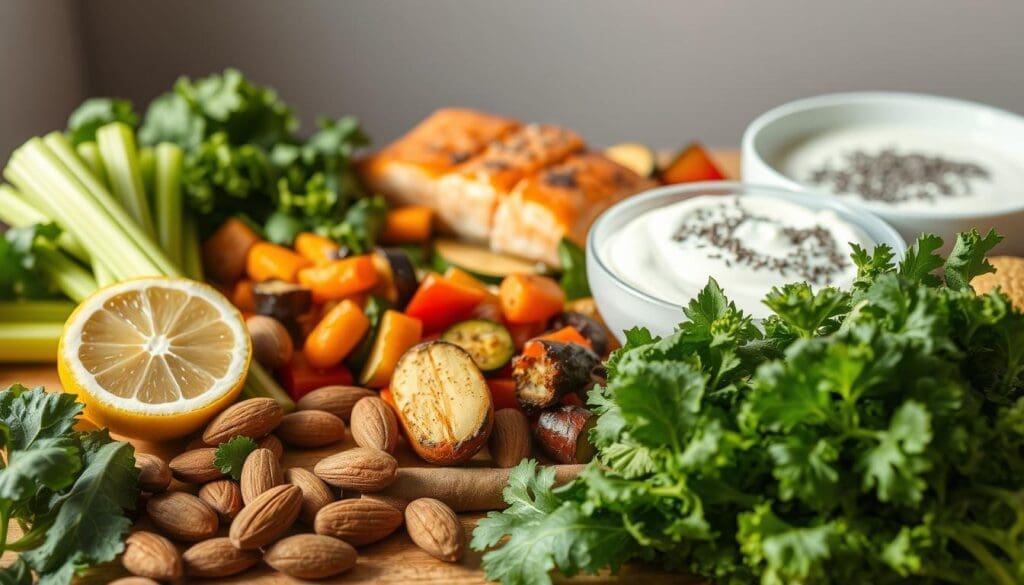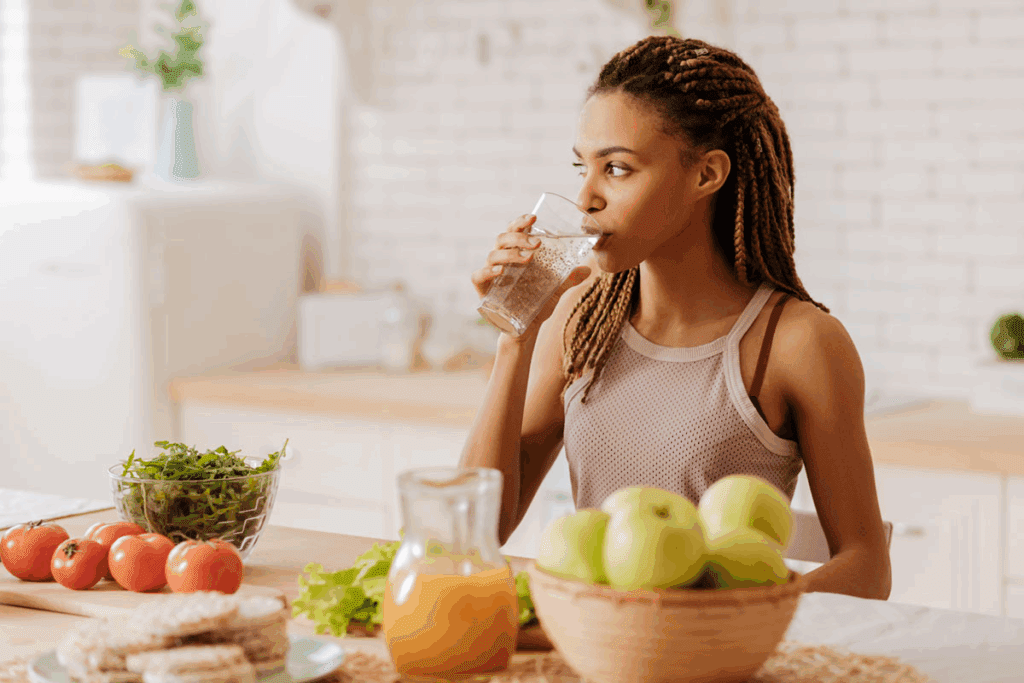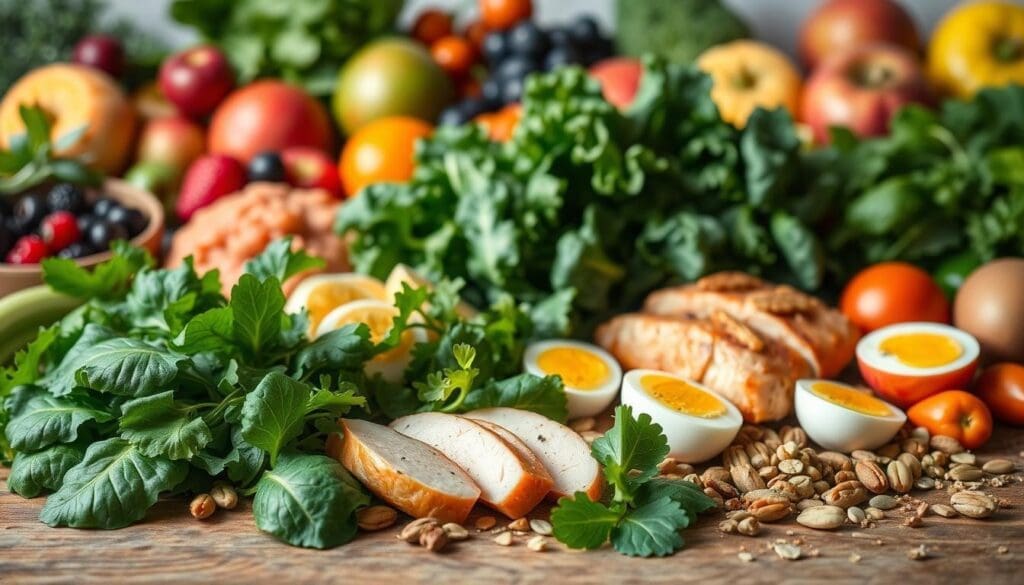Last Updated on November 26, 2025 by Bilal Hasdemir

Eating well is key to keeping your gallbladder healthy and easing pain. At Liv Hospital, we suggest a diet full of fiber, lean proteins, vitamin C, and good fats. This helps with your overall health.
Choosing the right foods can help control your symptoms and avoid bigger problems. Good choices include whole grains, fruits, veggies, white fish, low-fat dairy, and plant-based proteins.
By picking the right foods, you can manage gallbladder pain better. This helps you stay healthy for a long time.

To understand why a gallbladder-friendly diet is important, we must first know what the gallbladder does. It’s a small, pear-shaped organ under the liver. It plays a key role in our digestion.
The gallbladder’s main job is to store bile, a digestive fluid made by the liver. Bile breaks down fats into smaller pieces. This makes it easier for enzymes to process them further.
This process is key for absorbing fat-soluble vitamins like A, D, E, and K.
Gallbladder problems can come from many sources, like gallstones, inflammation, and a bad diet. Symptoms include:
These symptoms can really hurt your quality of life. That’s why a gallbladder pain diet is so important. It helps reduce strain on the gallbladder.
Diet is very important for gallbladder health. Eating too much unhealthy fat can strain the gallbladder. This can lead to problems like gallstones. But, a diet full of fiber and low in bad fats can help the gallbladder work better.
Here are some key diet tips:
Knowing how diet affects gallbladder health helps us make better choices. These choices support our digestive system and overall health.

Diet is key to keeping the gallbladder healthy. Eating foods that are gentle on the gallbladder can prevent pain and problems.
A low-fat diet is essential for gallbladder health. Foods low in fat don’t strain the gallbladder as much. Foods like lean proteins, fruits, and vegetables are good choices. Avoid high-fat foods like fried foods and fatty meats, as they can cause attacks.
Fiber is important for gallbladder health. It aids digestion and can lower the risk of gallstones. Drinking enough water is also key. It helps with digestion and prevents bile concentration, which can cause gallstones.
Eating regular, balanced meals is good for the gallbladder. Skipping meals can cause problems, as it fills the gallbladder with too much bile. Controlling portions is also important. Eating smaller meals can help avoid putting too much pressure on the gallbladder.
Following these dietary tips can greatly support gallbladder health. A diet low in fat, high in fiber, and with enough water is beneficial. Proper meal timing and portion control also help prevent gallbladder issues and improve overall health.
Fruits and vegetables are key for a healthy gallbladder. They are full of fiber, vitamins, and minerals. These nutrients help keep your gallbladder working right and ease symptoms.
Some top foods for gallbladder health are leafy greens, apples, berries, and beets. These foods are not just good for you. They also lower the chance of gallstones and other gallbladder issues.
Leafy greens are full of nutrients and antioxidants. They support your gallbladder and overall health. They have lots of fiber, which aids digestion and prevents constipation.
Apples are full of fiber and antioxidants. The fiber in apples helps keep your bowels regular. This is good for your gallbladder health.
Eating an apple a day is a simple way to help your gallbladder.
Berries are packed with antioxidants and fiber. They are great for gallbladder health. They reduce inflammation and improve digestion.
Beets are a nutrient-rich vegetable that supports liver and gallbladder health. They are full of fiber and antioxidants. These help with detoxification and reducing inflammation.
You can add beets to salads or roast them as a side dish. It’s a simple way to get their benefits.
Whole grains and foods high in fiber are key for a healthy gallbladder. They are packed with nutrients and fiber. This helps keep your gallbladder working well and supports your digestive health.
Adding whole grains like oatmeal, brown rice, and quinoa to your meals is beneficial. Let’s look at some of these grains and how they help your gallbladder.
Oatmeal is full of soluble fiber, which can lower cholesterol and prevent gallstones. Is oatmeal good for gallbladder? Yes, it is. The fiber in oatmeal helps keep your bowels regular and prevents constipation, which can harm your gallbladder.
Starting your day with oatmeal is a smart choice. You can make it even better by adding fruits or nuts.
Brown rice is a great whole grain, full of fiber and nutrients. It’s healthier than white rice because it keeps its bran and germ. Brown rice can help support gallbladder health by adding fiber and magnesium, which helps prevent gallstones.
It’s easy to add brown rice to your meals. Just swap it for white rice in your favorite dishes.
Quinoa is a nutrient-rich whole grain, high in protein and fiber. It also has magnesium and other important minerals. Quinoa supports gallbladder health by providing a mix of nutrients that helps with digestion.
In summary, whole grains like oatmeal, brown rice, and quinoa are tasty and good for your gallbladder. Adding them to your diet helps your gallbladder function and improves your overall health.
Eating lean proteins can ease gallbladder pain and keep it healthy. These proteins are easier to digest than fatty meats. Adding lean proteins to your meals helps your gallbladder stay healthy and lowers the risk of problems.
White fish like cod, tilapia, and halibut are full of lean protein. They are low in fat and packed with nutrients. They are also gentle on your stomach, which is good for those with gallbladder pain.
Skinless chicken and turkey are also good for lean protein. Without the skin, they have less fat, making them better for your gallbladder. They can be cooked in many ways, keeping your meals exciting and varied.
Beans and lentils are not just high in protein but also in fiber. They are low in fat and help control cholesterol, which is good for your gallbladder.
Adding these lean proteins to your diet supports your gallbladder health. It’s about making smart food choices and eating a balanced diet.
Healthy fats and dairy are key for a healthy gallbladder. It might seem odd to eat fats when you have gallbladder problems. But, some fats can actually help and make you feel better.
Olive oil is full of good fats. These fats can help your gallbladder work better. They can also make bile flow better, which might lower the chance of gallstones.
Tip: Use olive oil for cooking or in salads. It’s tasty and good for you.
Avocados are full of healthy fats and fiber. They’re great for your gallbladder. The fats in avocados can also help with inflammation.
“Avocados are not only delicious but also packed with nutrients that support digestive health.”
Nuts and seeds like walnuts and flaxseeds are good for you. They have omega-3s and fiber. Eating a little bit every day can be healthy.
Low-fat dairy like milk, yogurt, and cheese is good for you. They have calcium and protein. Choosing low-fat options can help your gallbladder stay healthy.
| Dairy Product | Benefits |
| Low-Fat Milk | Rich in calcium, supports bone health |
| Yogurt | Probiotics support gut health |
| Low-Fat Cheese | Good source of protein and calcium |
Eating healthy fats and dairy can help your gallbladder. It can also make your symptoms better. Making smart food choices is a good way to keep your gallbladder healthy.
The right diet can greatly support gallbladder health. A good diet keeps the gallbladder healthy and prevents problems. We’ll look at two diets that help: the Mediterranean Diet and the DASH Diet.
The Mediterranean Diet is known for its health benefits, including gallbladder health. It focuses on:
This diet helps maintain a healthy weight and lowers gallbladder disease risk.
The DASH Diet was made to fight high blood pressure but also benefits the gallbladder. It includes:
The DASH Diet’s balanced eating helps manage weight and lower gallbladder risks.
Here’s a meal plan that combines Mediterranean and DASH Diet elements for gallbladder health:
| Meal | Food |
| Breakfast | Oatmeal with fresh berries and low-fat milk |
| Lunch | Grilled chicken salad with mixed greens, olive oil, and whole grain crackers |
| Dinner | Baked salmon with quinoa and steamed vegetables |
| Snack | Apple slices with almond butter |
This meal plan is great for gallbladder health because it includes whole grains, lean proteins, and healthy fats.
Knowing what to eat is key when you have gallbladder problems. But it’s also important to know what to avoid. A good diet helps manage gallbladder health.
High-fat and fried foods are bad for gallbladder health. They’re hard for the gallbladder to handle because they need more bile to digest. Eating these foods can lead to gallbladder attacks, causing pain and discomfort.
Here are some foods to limit or avoid:
Processed and refined foods can also worsen gallbladder problems. They often have unhealthy fats, added sugars, and refined carbs. These can strain the gallbladder.
Here are some foods to avoid:
Everyone reacts differently to foods, but some are known to cause problems for those with gallbladder issues. Knowing these can help manage symptoms.
| Food Category | Examples | Potential Impact |
| Spicy Foods | Hot peppers, spicy curries | Can irritate the gallbladder and worsen symptoms |
| Caffeine | Coffee, energy drinks | Can stimulate the gallbladder, potentially causing pain |
| Carbonated Drinks | Soda, sparkling water | Can cause bloating and discomfort |
By avoiding or limiting these foods, people with gallbladder issues can reduce symptoms. This can improve their quality of life.
Creating a diet plan for gallbladder health means choosing the right foods and avoiding bad ones. We’ve looked at the best foods for gallbladder health. These include whole grains, fruits, vegetables, lean proteins, and healthy fats.
A balanced diet with these foods supports gallbladder health. When your gallbladder hurts, eat low-fat, high-fiber foods like oatmeal, apples, and leafy greens. These can ease symptoms and improve your health.
To make your own diet plan, start adding these foods to your meals. Try a Mediterranean or DASH diet, which focuses on whole grains, fruits, and veggies. Making smart food choices can lower gallbladder risks and keep your digestive system healthy.
By following these tips and watching what you eat, you can make a diet that helps with gallbladder pain. Knowing what to eat for a healthy gallbladder is vital. It helps keep your digestive system balanced and reduces gallbladder problems.
Foods high in fiber, lean proteins, and healthy fats can ease gallbladder pain. Try leafy greens, apples, berries, beets, oatmeal, brown rice, quinoa, white fish, and low-fat dairy.
Yes, oatmeal is full of fiber, which is great for the gallbladder. Adding oatmeal to your meals can help keep your gallbladder healthy.
Foods low in fat, high in fiber, and full of nutrients are best for gallbladder health. Include fruits, veggies, whole grains, lean proteins, and healthy fats in your diet.
When your gallbladder hurts, eat low-fat, easy-to-digest foods. Stick to crackers, toast, plain rice, bananas, and applesauce.
Eating well is key to a healthy gallbladder. Avoid foods high in fat, sugar, and refined carbs. Instead, choose fiber-rich, lean protein, and healthy fats.
The Mediterranean and DASH diets are good for gallbladder health. They focus on whole grains, fruits, lean proteins, and healthy fats.
Stay away from high-fat, fried, processed, and refined foods. They can strain your gallbladder and make symptoms worse. Limit or avoid these foods.
Yes, eating the right foods and avoiding triggers can help manage pain. A balanced diet low in fat, high in fiber, and rich in nutrients can ease symptoms.
Create a diet plan by adding recommended foods and avoiding triggers. Think about your needs and preferences to support your gallbladder health.
Yes, foods like leafy greens, apples, berries, beets, oatmeal, brown rice, quinoa, white fish, and low-fat dairy are good for gallbladder health.
Garruti, G., et al. (2018). Cholecystectomy: a way forward and back to metabolic disease? Current Opinion in Lipidology, 29(3), 189-195. Retrieved from https://pmc.ncbi.nlm.nih.gov/articles/PMC8114797
Subscribe to our e-newsletter to stay informed about the latest innovations in the world of health and exclusive offers!